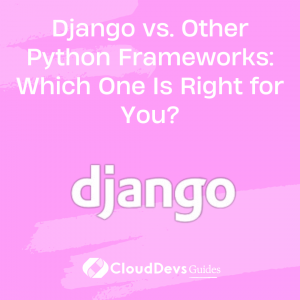Django vs. Other Python Frameworks: Which One Is Right for You?
In the current software development landscape, Python has become one of the most popular languages, prized for its simplicity and efficiency. A part of Python’s appeal is its robust frameworks, which enable faster and more efficient web development. Among these, Django stands out as one of the most recognized, leading many companies to hire Django developers for their projects. But how does Django measure up against other Python frameworks such as Flask, Pyramid, or FastAPI? Whether you’re considering hiring Django developers or using another framework, this blog aims to demystify that question for you.
Django
Django, often termed as the “framework for perfectionists with deadlines,” is a high-level Python web framework that promotes fast development and a clean, pragmatic design. It is feature-packed, providing an admin panel, database interfaces, an ORM, and a ready-to-use directory structure for web applications right out of the box. This richness in features is one reason why businesses opt to hire Django developers for their projects. Django follows the DRY (Don’t Repeat Yourself) principle, which not only streamlines development but also makes it an excellent choice for large applications and systems with lots of repetitive tasks. Hiring Django developers can mean a significant boost in efficiency for such projects.
Pros
– Django’s ORM supports a wide range of databases and makes database manipulations easier.
– Its inbuilt authentication mechanism makes handling user accounts and passwords convenient.
– With the automatic admin interface, administrative activities can be carried out seamlessly.
Cons
– Django’s monolithic and large size could be overwhelming, particularly for beginners.
– It may be overkill for smaller projects or simple applications, given its vast array of features.
– Django is not as flexible when it comes to building asynchronous applications, though recent versions have started supporting asynchronous features.
Flask
Flask is a microframework for Python, meaning it is lightweight and modular. Unlike Django, it does not provide a plethora of built-in features but it’s highly extensible and grants developers more control over the components they wish to use. Flask is often used for smaller projects or microservices, where simplicity and flexibility are paramount.
Pros
– Flask is lightweight, simple, and great for small-scale applications.
– It offers more flexibility than Django as developers can handpick libraries and tools for specific tasks.
– Flask is excellent for creating RESTful APIs.
Cons
– Flask lacks the built-in features that Django provides, so you might need to write more code or add more plugins.
– There’s no in-built ORM, so developers will need to manually handle the database operations.
– It is not suitable for larger applications with complex needs unless it’s combined with other libraries or tools.
Pyramid
Pyramid is another Python framework that lies somewhere between Flask’s simplicity and Django’s robustness. It’s adaptable and can be used for both small and large applications. Pyramid is known for its flexibility and straightforwardness, allowing developers to choose their tools and location for components.
Pros
– Pyramid is flexible and scalable, suitable for both small and complex applications.
– It allows developers to choose their database, URL structure, templating style, and more.
– Pyramid has built-in support for authentication and authorization.
Cons
– Pyramid has a steeper learning curve compared to Django and Flask.
– It has a smaller community and fewer resources available, which could potentially slow down development.
– Some developers may find its flexibility overwhelming, as there are so many choices to make.
FastAPI
FastAPI is a relatively new Python framework, which is built for speed and performance. It’s designed to build APIs quickly and with fewer bugs by leveraging Python’s type hinting. FastAPI also supports asynchronous request handling, making it suitable for applications requiring high performance and concurrency.
Pros
– FastAPI is fast. It’s one of the quickest Python frameworks available, even outperforming NodeJS and Go in some benchmarks.
– It leverages Python’s type hints to automatically generate API documentation and validate data.
– It supports asynchronous request handling, which can help create highly scalable applications.
Cons
– FastAPI is relatively new, so it may lack some features found in more mature frameworks.
– The community is still growing, which means there might be fewer resources to draw from or slower resolution of issues.
– It may not be suitable for simpler applications, where its speed and performance benefits are less noticeable.
Conclusion
The choice between Python frameworks is project-specific. Django is suitable for large, complex applications, often making it necessary to hire Django developers. Flask is best for simpler, smaller applications. Pyramid serves both large and small projects well, while FastAPI is the go-to for high-performance, asynchronous applications. Before deciding, it’s essential to assess your project requirements, each framework’s strengths and weaknesses, community support, learning curve, and development speed. If your project aligns with Django’s strengths, hiring Django developers can drive efficiency. The optimal framework matches your project needs, development style, and expertise.
Table of Contents







